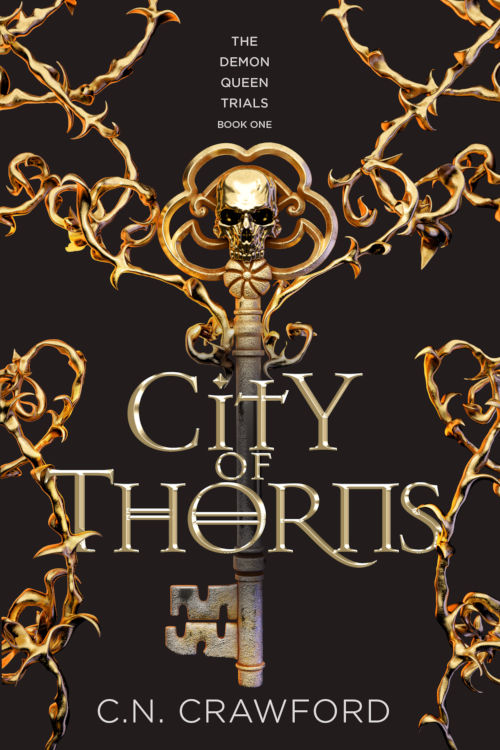City of Thorns
Author: C.N. Crawford

Spice Level: 



Release Year: 2021
The Demon Queen Trials series is like stumbling into a shadowy alley where neon-lit magic pulses alongside gritty urban decay—a messy, intoxicating blend I couldn’t quit. You’ll either love it or hate it, and honestly, I oscillated between both. The premise hooks you: a broke college student impersonating a succubus to infiltrate a demonic city? Sign me up. But here’s the rub—the execution is as uneven as a cobblestone street in the City of Thorns. Rowan’s voice swings between relatable millennial angst and cringe-worthy monologues, while Orion’s “Lord of Chaos” schtick walks the line between intriguing and eye-rollingly cliché. Yet, against all odds, their chemistry crackles like live wires in a rainstorm. I found myself flipping pages faster than a demon dodging holy water, even when the plot meandered into predictable territory.
Let’s talk spice. This series earns its 3.75 rating not through graphic scenes but through relentless, slow-burn tension. Orion’s seduction “lessons” toe the line between mentorship and manipulation, and Rowan’s internal struggle—part resolve, part desperation—adds layers to their dynamic. It’s less about explicit heat and more about the thrill of danger, the ache of forbidden attraction. Some readers complained about the insta-lust, but I’d argue it’s baked into the lore: demons thrive on desire, and Crawford weaponizes that primal energy like a maestro. The real payoff isn’t in the kisses (though there are plenty) but in the power plays—shifting alliances, whispered secrets, and the gnawing fear that trust here is a currency with abysmal exchange rates.
Urban fantasy thrives on world-building, and here’s where the series shines… and stumbles. The collision of modern tech and ancient magic—demons terrified of iPhones!—is either brilliantly absurd or jarringly silly, depending on your tolerance for paradox. I adored the juxtaposition of Ivy League-esque academies and blood-soaked rituals, but the rules of this universe feel as stable as a Jenga tower mid-game. Mortals and demons coexist in a fragile détente, yet the political stakes often get drowned out by Rowan’s personal vendetta. It’s a missed opportunity, though one I’m willing to forgive because the atmosphere—dank dungeons, glittering demon courts, lurking betrayals—oozes addictive, pulpy charm.
Pacing? Let’s just say this trilogy could’ve been a duology. The first book crackles with momentum, but the sequels sag under repetitive trials and underdeveloped subplots. Garden of Serpents especially feels rushed, its climax resolving off-page like a Netflix show axed mid-season. Yet, even when the narrative falters, the emotional core holds. Rowan’s grief over her mother’s murder isn’t just a plot device—it’s a raw, driving force that grounds her in a world where everyone else seems to be playing 4D chess. Orion’s vulnerability, when it peeks through his god-complex armor, delivers moments of genuine pathos. I’d have traded a few filler chapters for deeper dives into secondary characters, though—the loyalists and traitors haunting this world deserve more than cardboard cutout treatment.
So why does this mess of a series sit at #20 on my romantasy shelf? Because it’s unapologetically fun. It doesn’t pretend to be high literature, and that’s its strength. The Demon Queen Trials is the literary equivalent of a midnight diner burger: greasy, over-the-top, and weirdly satisfying. You’ll groan at some dialogue (“You taste like lies and strawberries” lives rent-free in my cringe cortex), then gasp when a twist sucker-punches you. It’s flawed, frenetic, and—like Orion’s chaotic magic—impossible to fully control or resist. If you’ve ever wanted to scream “JUST KISS ALREADY” at fictional characters while low-key rooting for societal collapse, congratulations: your next obsession awaits.
Back to List